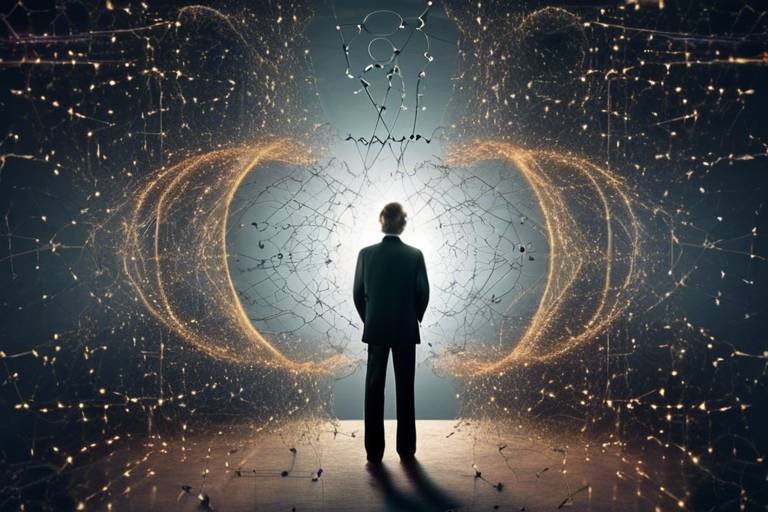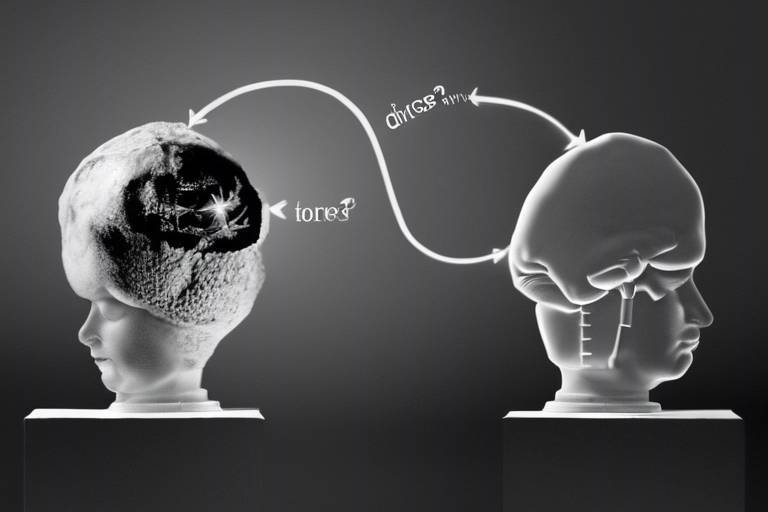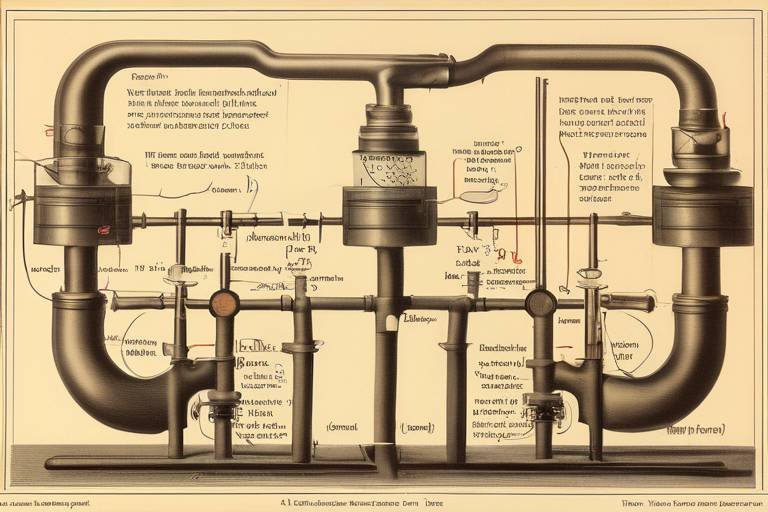Does Quantum Physics Provide a Pathway to the Understanding of Consciousness?
In a world where the boundaries of science and philosophy intersect, the question of whether quantum physics can illuminate the nature of consciousness has sparked intense debate and curiosity. Imagine standing at the edge of a vast ocean, where the waves of scientific inquiry crash against the shores of our understanding of the mind. This article embarks on an exploration of this intriguing intersection, delving into theories, implications, and the potential for a deeper understanding of human consciousness through the lens of quantum mechanics.
At its core, consciousness is one of the most profound mysteries of human existence. It shapes our perceptions, influences our decisions, and colors our interactions with the world around us. But what if the key to unlocking this enigma lies in the principles of quantum physics? As we navigate through this complex terrain, we will examine the Quantum Mind Hypothesis, which posits that quantum phenomena might play a crucial role in cognitive processes. This theory suggests that consciousness is not merely a byproduct of neural activity but could arise from the intricate dance of quantum states and interactions within our brain's neural networks.
To grasp the implications of quantum physics for consciousness, it's essential to understand the historical context of quantum mechanics. The journey began in the early 20th century with groundbreaking discoveries that challenged our conventional understanding of reality. Key figures such as Max Planck and Niels Bohr laid the groundwork for this revolutionary field, influencing contemporary discussions about the relationship between quantum mechanics and consciousness. Their contributions have sparked a multitude of questions: How do quantum principles relate to the workings of the human mind? Can the act of observation alter our perception of reality, and if so, what does that mean for our understanding of consciousness?
As we explore these questions, we encounter the Copenhagen Interpretation of quantum mechanics, which proposes that quantum particles exist in multiple states until observed. This notion raises fascinating speculation about the role of consciousness in shaping reality. Could it be that our awareness influences the very fabric of the universe? The implications of such a perspective are staggering, suggesting that consciousness might not just be a passive observer but an active participant in the unfolding of reality itself.
Moreover, the phenomenon of quantum entanglement introduces another layer of complexity to our understanding of consciousness. This phenomenon describes how particles can become interconnected, regardless of the distance separating them. It hints at a form of interconnectedness that transcends physical boundaries and suggests that our understanding of collective human experience might be rooted in a shared consciousness. This idea challenges the conventional view of individual minds, proposing that our thoughts and feelings could be part of a larger, interconnected web of consciousness.
However, the exploration of quantum consciousness is not without its challenges. Critics, particularly from the field of neuroscience, argue against the application of quantum physics to consciousness. They advocate for a more materialistic understanding of brain function, emphasizing that cognitive processes can be explained through established neuroscientific principles without invoking quantum phenomena. This raises important questions about the validity of quantum consciousness theories and whether they can withstand rigorous scientific scrutiny.
The philosophical implications of linking quantum physics to consciousness are equally profound. By considering the nature of reality, free will, and determinism, we are prompted to reevaluate traditional philosophical views. If consciousness is indeed intertwined with quantum mechanics, what does that mean for our understanding of human agency and the nature of existence itself?
Looking ahead, the future of research in this field holds promise for uncovering new insights into the relationship between quantum physics and consciousness. As scientists continue to investigate the potential correlations between these two realms, we may be on the brink of breakthroughs that could reshape our understanding of human cognition, perception, and the fundamental nature of reality. The journey is far from over, and the mysteries of consciousness may yet reveal themselves through the lens of quantum physics.
- What is the Quantum Mind Hypothesis? - It suggests that quantum phenomena are integral to cognitive processes, proposing that consciousness arises from quantum states in the brain.
- How did historical figures contribute to this field? - Physicists like Max Planck and Niels Bohr laid the foundations of quantum theory, influencing thoughts on consciousness.
- What is quantum entanglement? - A phenomenon where particles become interconnected, hinting at a form of collective consciousness.
- What challenges do quantum consciousness theories face? - Critics argue for a materialistic understanding of cognition, questioning the empirical support for quantum theories.
- What are the future directions in this research? - Ongoing studies may uncover new insights into how quantum mechanics relates to human consciousness.

The Quantum Mind Hypothesis
The Quantum Mind Hypothesis is a fascinating concept that suggests the intricate workings of our consciousness may not be entirely rooted in classical physics. Instead, it proposes that quantum phenomena could play a pivotal role in how we think, feel, and perceive the world around us. Imagine consciousness as a vast ocean, where quantum mechanics serves as the undercurrents that shape the waves of our thoughts and experiences. This hypothesis posits that the brain operates not merely as a biological machine but as a complex quantum system, where quantum states and interactions within neural networks give rise to the rich tapestry of human cognition.
At its core, the Quantum Mind Hypothesis challenges the traditional view of consciousness as a straightforward byproduct of neural activity. Instead, it opens up a realm of possibilities where consciousness is intertwined with the fundamental principles of quantum mechanics. This perspective invites us to consider questions such as: Could our thoughts exist in multiple states simultaneously, like quantum particles? Are our minds capable of tapping into a larger, interconnected consciousness that transcends individual experiences? These questions not only stimulate intellectual curiosity but also bridge the realms of science and philosophy.
To delve deeper into this hypothesis, researchers have explored various theories and models that integrate quantum mechanics with cognitive processes. One intriguing idea is that the brain's microtubules—tiny structures within neurons—may exhibit quantum behavior, potentially allowing for quantum computation within the brain. This notion draws on the work of physicists like Roger Penrose and Stuart Hameroff, who have suggested that consciousness arises from orchestrated objective reduction (Orch-OR) processes occurring at the quantum level.
While the Quantum Mind Hypothesis is still a subject of ongoing research and debate, it has profound implications for our understanding of consciousness. If true, it could reshape our perceptions of reality and our place within it. Imagine being able to unlock the secrets of the mind by harnessing the principles of quantum physics! This intersection of disciplines not only enriches our understanding of cognitive science but also invites us to explore the mysteries of existence itself.
In summary, the Quantum Mind Hypothesis serves as a compelling framework for exploring the depths of consciousness. By considering the potential role of quantum mechanics, we may uncover insights that challenge our conventional understanding of the mind and reality. As we continue to investigate this captivating intersection, who knows what revelations await us in the vast ocean of consciousness?
- What is the Quantum Mind Hypothesis?
The Quantum Mind Hypothesis suggests that quantum phenomena may play a crucial role in cognitive processes, proposing that consciousness arises from quantum states and interactions within the brain's neural networks.
- How does quantum mechanics relate to consciousness?
Quantum mechanics provides a framework that may explain aspects of consciousness that traditional neuroscience cannot, suggesting that cognitive processes could be influenced by quantum states.
- What are microtubules, and why are they important?
Microtubules are structural components of neurons that may exhibit quantum behavior, potentially allowing for quantum computation within the brain, which is central to the Quantum Mind Hypothesis.
- Are there criticisms of the Quantum Mind Hypothesis?
Yes, there are significant challenges and critiques, particularly from neuroscientific perspectives that advocate for a more materialistic understanding of brain function without relying on quantum phenomena.

Historical Context of Quantum Physics
The journey into the realm of quantum physics is a fascinating tale that intertwines the evolution of scientific thought with the very fabric of reality. To truly appreciate the implications of quantum mechanics on our understanding of consciousness, we must first delve into its historical roots. The early 20th century marked a pivotal moment in physics, where traditional Newtonian mechanics began to crumble under the weight of experimental evidence that could not be explained by classical theories. This era birthed revolutionary ideas that challenged our perceptions of reality and existence.
At the heart of this transformation were a few brilliant minds whose contributions laid the foundation for quantum physics as we know it today. Among them, Max Planck and Niels Bohr stand out as towering figures whose insights reshaped the scientific landscape. Planck's introduction of the quantum concept in 1900, which proposed that energy is quantized and emitted in discrete packets called quanta, was a radical departure from the established norms. This idea not only revolutionized physics but also sparked a series of inquiries into the nature of light and matter, prompting scientists to rethink the very essence of energy.
Following closely, Niels Bohr's work in the early 1900s further advanced the field. His model of the atom, which introduced the idea of quantized energy levels, helped explain the spectral lines of hydrogen and provided a framework for understanding atomic structure. Bohr's interpretations emphasized the significance of observation in quantum mechanics, leading to the now-famous Copenhagen Interpretation. This theory posited that quantum particles exist in multiple states until they are observed, suggesting a profound relationship between consciousness and the physical world.
To better understand the historical context, let’s break down some key milestones in the development of quantum physics:
| Year | Event | Key Figure |
|---|---|---|
| 1900 | Max Planck introduces the quantum concept. | Max Planck |
| 1913 | Niels Bohr develops the Bohr model of the atom. | Niels Bohr |
| 1927 | Heisenberg's uncertainty principle is formulated. | Werner Heisenberg |
| 1935 | Einstein, Podolsky, and Rosen publish their famous paper. | Albert Einstein |
These milestones not only highlight the progression of thought within quantum physics but also illustrate the growing intrigue surrounding the implications of these theories. As physicists grappled with the counterintuitive nature of quantum mechanics, questions about the nature of reality itself began to arise. How does the act of observation influence the behavior of particles? Can consciousness itself play a role in shaping the physical world? These questions remain at the forefront of scientific inquiry and philosophical debate, drawing connections between the quantum realm and the nature of human consciousness.
As we explore the historical context of quantum physics, it becomes clear that the journey is far from over. The interplay between scientific discovery and philosophical contemplation continues to evolve, inviting us to ponder the mysteries of existence. The implications of these early 20th-century breakthroughs are still being felt today, as researchers strive to bridge the gap between quantum mechanics and the enigmatic phenomenon of consciousness.

Key Figures in Quantum Mechanics
When we dive into the world of quantum mechanics, it's impossible to ignore the contributions of a few key figures who have shaped our understanding of this complex field. Among them, Max Planck and Niels Bohr stand out as monumental pioneers whose ideas continue to resonate today. Their groundbreaking theories not only revolutionized physics but also opened up a Pandora's box of questions regarding the nature of reality and consciousness itself.
Max Planck, often referred to as the father of quantum theory, introduced the revolutionary idea that energy is quantized. This was a radical departure from classical physics, which treated energy as a continuous flow. Planck's quantum hypothesis, which suggested that energy could only be emitted or absorbed in discrete units called "quanta," laid the groundwork for future developments in quantum mechanics. Imagine trying to fill a glass with water, but instead of a steady stream, you could only add water in distinct drops. This analogy captures the essence of Planck's insight: energy behaves in a manner that is not as straightforward as we once believed.
Niels Bohr further expanded on Planck's ideas by developing the Copenhagen Interpretation of quantum mechanics. He proposed that particles exist in a state of probability until they are observed, which raises profound questions about the role of consciousness in the act of observation. What if our very act of perceiving the world around us shapes that reality? Bohr's interpretations invite us to ponder the relationship between the observer and the observed, suggesting that consciousness might play a pivotal role in the unfolding of events at the quantum level.
Both Planck and Bohr were not just scientists; they were also philosophers in their own right. Their ideas challenged the deterministic view of the universe, suggesting instead that reality might be more fluid and interconnected than we previously thought. This notion of interconnectedness leads us to consider how these quantum principles could relate to our understanding of consciousness. Are our thoughts and perceptions merely products of biological processes, or could they be influenced by the underlying quantum fabric of reality?
As we reflect on the contributions of these key figures, we must also acknowledge the broader implications of their work. Their insights have sparked a multitude of questions that bridge the gap between science and philosophy. For instance, how do we define reality in a world where the act of observation alters outcomes? And what does this mean for our understanding of consciousness? The quest for answers continues, propelled by the foundational principles laid out by Planck and Bohr.
In summary, the legacy of Max Planck and Niels Bohr serves as a beacon for those exploring the intersection of quantum mechanics and consciousness. Their revolutionary ideas have not only transformed physics but have also provided fertile ground for philosophical inquiry. As we continue to explore these profound questions, we find ourselves standing on the shoulders of giants, eager to uncover the mysteries that lie at the heart of our existence.
- What is quantum mechanics? Quantum mechanics is a fundamental theory in physics that describes the physical properties of nature at the scale of atoms and subatomic particles.
- How does quantum mechanics relate to consciousness? Some theories suggest that quantum phenomena may play a role in cognitive processes, offering a unique perspective on how consciousness arises.
- Who were the key figures in quantum mechanics? Key figures include Max Planck, known for introducing the concept of quantized energy, and Niels Bohr, who developed the Copenhagen Interpretation.
- What is the Copenhagen Interpretation? The Copenhagen Interpretation posits that quantum particles exist in multiple states until observed, leading to questions about the influence of consciousness on reality.
- What challenges exist in linking quantum physics to consciousness? Critics argue that there is a lack of empirical evidence supporting the connection, and that neuroscience offers a more materialistic view of cognition.

Max Planck's Contributions
Max Planck, often regarded as the father of quantum theory, made groundbreaking contributions that not only transformed the landscape of physics but also opened the door to a myriad of philosophical inquiries, particularly concerning consciousness. In 1900, Planck introduced the concept of quantization of energy, proposing that energy is not continuous but rather exists in discrete units called quanta. This revolutionary idea challenged the classical notions of physics and laid the foundation for the development of quantum mechanics.
Planck's work was pivotal in understanding how energy interacts with matter at the microscopic level. By suggesting that energy could be emitted or absorbed only in fixed amounts, he shifted the paradigm of scientific thought. This concept not only had profound implications for physics but also raised questions about the nature of reality and how we perceive it. Could it be that our consciousness, as a product of the brain's neural processes, is also influenced by these quantum interactions? This question is at the heart of the ongoing dialogue between quantum physics and consciousness.
One of the most intriguing aspects of Planck's contributions is his assertion that the universe is fundamentally connected through these quantum phenomena. He famously stated, “All matter originates and exists only by virtue of a force which brings the particles of an atom to vibration and holds this most minute solar system of the atom together.” This idea hints at an interconnectedness that resonates with contemporary theories of collective consciousness, suggesting that perhaps our individual experiences are part of a larger, unified field of awareness.
Planck's legacy is not just limited to his scientific discoveries; it also extends into the philosophical realm. His work invites us to ponder questions such as:
- What is the relationship between the observer and the observed?
- How does consciousness interact with the physical world?
- Is there a deeper reality that connects all conscious beings?
In summary, Max Planck's contributions to quantum theory serve as a crucial link between the physical and the metaphysical. His ideas continue to inspire scientists and philosophers alike, urging us to explore the enigmatic relationship between quantum physics and consciousness. As we delve deeper into these questions, we might just uncover insights that could reshape our understanding of the mind and its place in the universe.
- What is quantum consciousness? Quantum consciousness is a theoretical framework suggesting that quantum phenomena play a role in cognitive processes and consciousness.
- Who is Max Planck? Max Planck was a German physicist who is considered the father of quantum theory, introducing the concept of energy quanta.
- How does quantum physics relate to consciousness? Some theories propose that quantum mechanics may help explain aspects of consciousness, suggesting that our mental states could be influenced by quantum processes.
- What are the challenges to quantum consciousness theories? Critics argue that there is a lack of empirical evidence supporting these theories and advocate for a more materialistic understanding of brain function.

Niels Bohr's Interpretations
Niels Bohr, a towering figure in the realm of quantum mechanics, brought forth interpretations that transformed our understanding of both physics and the nature of consciousness. His views emphasized the significance of observation in the quantum world, suggesting that the act of measurement is not merely a passive observation but an active process that influences the state of a quantum system. This idea leads us to ponder: could consciousness itself play a role in shaping reality? Bohr's perspective invites us to consider the interconnectedness of the observer and the observed, creating a fascinating dialogue between the observer's consciousness and the physical phenomena being observed.
One of Bohr's most famous principles is the concept of complementarity, which posits that objects can exhibit both particle-like and wave-like properties depending on how they are observed. This duality raises profound questions about the nature of reality itself. If reality can shift based on observation, what does that mean for our understanding of consciousness? Are our thoughts and perceptions merely reflections of a deeper, quantum reality? Bohr's interpretations challenge us to rethink the boundaries between mind and matter, suggesting a more intricate relationship between consciousness and the universe.
Moreover, Bohr's insistence on the importance of context in understanding quantum phenomena further deepens this inquiry. He argued that knowledge is fundamentally limited by the frameworks we use to interpret it. In this light, consciousness could be viewed as a lens through which we perceive reality, shaping our understanding and experience of the world. This perspective aligns with modern theories that explore consciousness as a fundamental aspect of the universe, rather than a mere byproduct of brain activity.
In essence, Bohr's interpretations not only laid the groundwork for quantum theory but also opened the door to exploring the intricate relationship between consciousness and reality. As we delve deeper into these ideas, we find ourselves at the crossroads of science and philosophy, where questions about free will, the nature of existence, and the role of the observer in shaping reality come to the forefront. In this ongoing exploration, Bohr's insights remain a guiding light, illuminating the path toward a deeper understanding of consciousness and its potential implications for our perception of the universe.
- What is the Copenhagen Interpretation?
The Copenhagen Interpretation, proposed by Niels Bohr and Werner Heisenberg, suggests that quantum particles exist in multiple states until they are observed, at which point they collapse into a single state. This interpretation highlights the role of the observer in determining the nature of reality.
- How does quantum entanglement relate to consciousness?
Quantum entanglement suggests that particles can become interconnected regardless of distance, prompting speculation that consciousness might also be interconnected, influencing our collective human experience.
- What are the criticisms of quantum consciousness theories?
Critics argue that there is a lack of empirical evidence supporting the idea that quantum mechanics plays a role in consciousness, advocating for a more materialistic understanding of brain function.
- What future research directions are being explored?
Future research may focus on uncovering new insights into the relationship between quantum physics and consciousness, potentially leading to breakthroughs in understanding human cognition and the nature of reality.

The Copenhagen Interpretation
The Copenhagen Interpretation, one of the most widely accepted interpretations of quantum mechanics, presents a fascinating perspective on the nature of reality and consciousness. Proposed primarily by physicists Niels Bohr and Werner Heisenberg in the early 20th century, this interpretation suggests that quantum particles exist in a state of superposition—essentially, they can be in multiple states or locations simultaneously until they are observed. This idea raises profound questions about the role of consciousness in shaping our understanding of the universe.
At its core, the Copenhagen Interpretation posits that the act of observation plays a crucial role in determining the state of a quantum system. Imagine a light switch that can be both on and off at the same time until someone flips it. This analogy illustrates how quantum particles behave: they exist in a haze of possibilities until a conscious observer interacts with them. This leads to the thought-provoking implication that consciousness itself may influence physical reality.
Moreover, the Copenhagen Interpretation challenges our traditional notions of reality. It suggests that reality is not a fixed entity but rather a fluid construct that is influenced by our perceptions and observations. This opens the door to the idea that consciousness could be more than just a byproduct of brain activity; it might be a fundamental aspect of the universe. To better understand this concept, let's consider some key aspects:
- Observer Effect: The principle that the act of observation affects the outcome of a quantum event.
- Wave-Particle Duality: The concept that particles can exhibit properties of both waves and particles, depending on how they are observed.
- Measurement Problem: The dilemma of how and when quantum systems transition from a state of superposition to a single outcome.
As we delve deeper into the implications of the Copenhagen Interpretation, we find ourselves at the intersection of physics and philosophy. It compels us to ask questions such as: Is consciousness a fundamental aspect of the universe? And, Could our awareness actually shape the physical world around us? These inquiries not only challenge our scientific understanding but also invite us to explore the very essence of what it means to be conscious.
In summary, the Copenhagen Interpretation does not merely provide a framework for understanding quantum mechanics; it opens up a dialogue about the nature of consciousness itself. By suggesting that observation plays a vital role in the behavior of quantum particles, it invites us to reconsider our place in the universe and the potential power of our minds. As we continue to explore these ideas, we may find that the boundaries between science and consciousness are more intertwined than we ever imagined.

Quantum Entanglement and Consciousness
Quantum entanglement is one of the most fascinating phenomena in quantum physics, where pairs or groups of particles become interconnected in such a way that the state of one particle instantly influences the state of another, regardless of the distance separating them. This concept raises profound questions about the nature of consciousness and its potential interconnectedness. Imagine two dancers performing a duet; even if they are separated by miles, their movements remain in sync. This analogy mirrors how entangled particles behave, suggesting that our understanding of consciousness might also be linked in ways we have yet to fully comprehend.
As we delve deeper into the implications of quantum entanglement, it becomes evident that it challenges our traditional notions of individuality and separation. If consciousness can be viewed through the lens of quantum mechanics, we might begin to see it as a collective experience rather than a solitary one. This idea posits that our thoughts, emotions, and experiences could be interwoven with those of others, creating a vast tapestry of shared consciousness. The implications of this perspective are staggering, as it invites us to reconsider the boundaries of our minds and the connections we share with one another.
Moreover, the phenomenon of non-locality inherent in quantum entanglement suggests that mental states may not be confined to our individual brains. Instead, they could be part of a larger, interconnected consciousness that transcends physical boundaries. This notion aligns with various philosophical and spiritual teachings that emphasize unity and interconnectedness among all beings. It compels us to ask: are our thoughts and feelings merely products of our individual brains, or are they part of a grander, collective consciousness?
Research in this area is still in its infancy, but scientists are beginning to explore the potential correlations between quantum entanglement and consciousness. Some studies have attempted to measure the effects of entangled particles on cognitive processes, while others investigate whether collective human experiences could be explained by quantum principles. Although the results are preliminary, they spark a sense of excitement and curiosity about the future of this field.
To summarize, the relationship between quantum entanglement and consciousness opens up a world of possibilities. It challenges us to rethink the way we perceive ourselves and our connections with others. As we continue to explore this intersection of science and philosophy, we may uncover new insights that not only enhance our understanding of consciousness but also redefine our place in the universe.
- What is quantum entanglement? Quantum entanglement is a phenomenon where two or more particles become linked in such a way that the state of one particle affects the state of another, regardless of the distance between them.
- How does quantum entanglement relate to consciousness? Some theories suggest that quantum entanglement may indicate a form of interconnectedness in consciousness, where individual thoughts and experiences are part of a larger, shared consciousness.
- Is there scientific evidence supporting the link between quantum physics and consciousness? While research is ongoing, the evidence is still limited, and many scientists advocate for a more materialistic understanding of consciousness without invoking quantum phenomena.

Implications of Non-Locality
The concept of non-locality in quantum physics is nothing short of mind-bending. Imagine a world where two particles, separated by vast distances, can instantly affect each other’s states. This phenomenon challenges our conventional understanding of space and time, suggesting that information can travel faster than light, defying the limits set by Einstein's theory of relativity. But what does this mean for our understanding of consciousness? Could it imply that our thoughts, feelings, and experiences are not just isolated events within our individual minds, but rather part of a larger, interconnected tapestry of consciousness?
Non-locality raises profound questions about the nature of reality and our place within it. If consciousness is indeed non-local, it might mean that our mental states are not confined to our brains or bodies. Instead, they could be part of a larger, collective consciousness that transcends individual experiences. This idea resonates with various spiritual and philosophical traditions that suggest a fundamental unity among all beings. For instance, consider how we often feel a deep connection with others, almost as if we share a mental space. This shared experience could be a glimpse into the non-local nature of consciousness.
Furthermore, the implications of non-locality extend into the realm of collective human experience. Think about moments of synchronicity—those uncanny instances when two people think the same thought or experience a coincidental event at the same time. Could these experiences be manifestations of a non-local consciousness at work? The interconnectedness suggested by quantum entanglement may provide a scientific framework for understanding these phenomena, blurring the lines between individual minds and suggesting a shared pool of consciousness.
However, while these ideas are tantalizing, they also invite skepticism. Many scientists argue that non-locality should not be conflated with consciousness. The leap from quantum mechanics to cognitive processes is fraught with challenges. For instance, how do we empirically test the notion of non-local consciousness? What frameworks can we develop to bridge the gap between the abstract principles of quantum physics and the tangible experiences of consciousness?
As research continues to explore the intersection of quantum mechanics and consciousness, it is essential to approach these questions with both curiosity and caution. The implications of non-locality could revolutionize our understanding of the mind, but they also require rigorous scientific inquiry to validate their claims. Ultimately, the exploration of non-locality may not only deepen our comprehension of consciousness but also challenge us to reconsider our fundamental beliefs about reality itself.
- What is non-locality in quantum physics? Non-locality refers to the phenomenon where particles can instantaneously affect each other’s states, regardless of the distance separating them.
- How does non-locality relate to consciousness? Non-locality suggests that consciousness may not be confined to individual minds, but rather part of a larger, interconnected consciousness.
- Can we empirically test non-local consciousness? Currently, there are significant challenges in empirically testing the concept of non-local consciousness, as it requires bridging quantum physics with cognitive science.
- What are the philosophical implications of non-locality? The implications include reevaluating our understanding of free will, determinism, and the nature of reality, as non-locality suggests a deeper interconnectedness among all beings.

Research on Consciousness and Quantum Mechanics
As we delve into the fascinating intersection of consciousness and quantum mechanics, it's essential to highlight the ongoing research that seeks to uncover the potential correlations between these two enigmatic realms. Scientists and philosophers alike have been intrigued by the possibility that quantum phenomena might be integral to our understanding of consciousness. This line of inquiry is not just speculative; it is rooted in experimental findings that challenge our traditional notions of cognition.
One prominent area of research focuses on the concept of quantum coherence, which suggests that the brain might utilize quantum states to process information in ways that classical physics cannot explain. For example, studies exploring the behavior of microtubules—tiny structures within neurons—have led to hypotheses that these components could facilitate quantum computations. This idea is bolstered by the work of physicist Roger Penrose and neuroscientist Stuart Hameroff, who proposed the Orchestrated Objective Reduction (Orch-OR) theory. According to their theory, consciousness arises from quantum processes in the brain, potentially offering a bridge between physics and the subjective experience of awareness.
Moreover, researchers are conducting experiments that probe the implications of quantum entanglement on consciousness. The notion that particles remain interconnected regardless of distance raises profound questions about the nature of human experience and shared consciousness. Some experiments, such as those conducted by Alain Aspect, have demonstrated the non-local properties of quantum particles, suggesting that our understanding of consciousness might extend beyond the confines of individual brains. This interconnectedness hints at a collective human experience that transcends physical boundaries, influencing our perceptions and interactions with one another.
However, the field is not without its challenges. Critics argue that while the ideas are captivating, they lack the empirical support necessary to establish a definitive link between quantum mechanics and consciousness. The complexity of the brain and the intricacies of quantum physics make it difficult to draw conclusive correlations. Ongoing research must navigate these challenges, employing rigorous methodologies to explore the potential quantum basis of conscious experience.
To summarize, the research on consciousness and quantum mechanics is an evolving landscape filled with both promise and skepticism. As scientists continue to investigate the potential quantum underpinnings of consciousness, we stand on the brink of potentially groundbreaking discoveries that could redefine our understanding of the mind and reality itself. The journey is just beginning, and the questions we seek to answer could lead us to profound insights about the very nature of existence.
- What is the Quantum Mind Hypothesis?
The Quantum Mind Hypothesis suggests that quantum phenomena may play a crucial role in cognitive processes, proposing that consciousness arises from quantum states and interactions within the brain's neural networks.
- How does quantum entanglement relate to consciousness?
Quantum entanglement implies that particles can become interconnected, suggesting that consciousness might also extend beyond individual minds, influencing our understanding of collective human experiences.
- What are the main criticisms of quantum consciousness theories?
Critics often point to the lack of empirical support for these theories and advocate for a more materialistic understanding of brain function and cognition that does not rely on quantum phenomena.

Challenges to Quantum Consciousness Theories
The intersection of quantum physics and consciousness is a captivating topic, but like any intriguing theory, it faces its fair share of challenges. One of the primary hurdles is the **lack of empirical support** for the idea that quantum phenomena play a significant role in conscious experience. While theories abound, the scientific community often calls for concrete evidence that can be replicated in experimental settings. This absence of robust data leaves many skeptics unconvinced, leading to a divide between proponents of quantum consciousness and traditional neuroscientific approaches.
Moreover, the complexity of bridging quantum mechanics and cognitive science cannot be overstated. Quantum mechanics operates on principles that are often counterintuitive and difficult to reconcile with our everyday understanding of the brain. For instance, concepts like superposition and entanglement challenge the classical view of isolated neural processes. This raises fundamental questions: Can we truly apply quantum principles to the workings of the human mind? Or are we merely drawing parallels that do not hold up under scrutiny?
Neuroscientific perspectives further complicate the discourse. Many neuroscientists advocate for a more **materialistic understanding** of brain function, positing that consciousness arises from biochemical processes and neural interactions rather than quantum states. They argue that the brain's complexity can be explained through established biological mechanisms without invoking quantum phenomena. This viewpoint is supported by advancements in neuroimaging and cognitive neuroscience, which provide insights into how brain activity correlates with conscious experience.
Additionally, the philosophical implications of linking quantum physics to consciousness are profound and challenging. When we start to consider the nature of reality, free will, and determinism, we find ourselves in a complex web of ideas that can lead to confusion and debate. For example, if consciousness is indeed linked to quantum processes, does that imply that our thoughts and decisions are not entirely our own? This line of questioning can be unsettling and has led to a reevaluation of traditional philosophical views, as well as a reconsideration of what it means to be conscious.
In summary, while the idea of quantum consciousness is fascinating and opens up a world of possibilities, it is essential to approach it with caution. The challenges we face—ranging from the lack of empirical evidence to philosophical dilemmas—demand rigorous investigation and open-minded discourse. As research continues, it may either bolster these theories or lead us to new understandings of consciousness that do not rely on quantum mechanics.
- What is the Quantum Mind Hypothesis? The Quantum Mind Hypothesis suggests that quantum phenomena may play a crucial role in cognitive processes, proposing that consciousness arises from quantum states and interactions within the brain's neural networks.
- How does quantum entanglement relate to consciousness? Quantum entanglement implies that particles can be interconnected, suggesting that consciousness might also be part of a larger, interconnected experience beyond individual minds.
- What are the main criticisms of quantum consciousness theories? Critics often point to the lack of empirical support and advocate for a materialistic understanding of brain function, arguing that consciousness can be explained through established biological processes.
- Are there any ongoing research efforts in this field? Yes, ongoing research is exploring potential correlations between consciousness and quantum mechanics, aiming to uncover new insights into human cognition and perception.

Critiques from Neuroscience
The intersection of quantum physics and consciousness has sparked a fascinating debate, but it has not come without its fair share of skepticism, particularly from the field of neuroscience. Many neuroscientists argue that the brain's complex neural networks can explain consciousness without invoking quantum mechanics. They contend that cognitive processes, emotions, and perceptions can be understood through traditional biological and chemical interactions, which are well-documented and observable.
One of the primary critiques is that quantum effects are generally expected to be negligible at the scale of biological systems. The brain operates at a warm temperature and in a wet environment, conditions that are thought to be unsuitable for maintaining quantum coherence. This leads to the question: if quantum phenomena are so fragile, can they really play a significant role in the robust and dynamic processes of the human mind?
Furthermore, neuroscientists often emphasize the importance of empirical evidence. They argue that while quantum consciousness theories are intriguing, they currently lack substantial experimental support. The brain is an incredibly intricate organ, and many aspects of its operation remain poorly understood. For example, the mechanisms behind memory formation, decision-making, and emotional regulation are still under active investigation. Neuroscience advocates suggest that before considering quantum explanations, we should focus on elucidating these biological processes.
Additionally, critiques from neuroscience often highlight the **materialistic** perspective that has dominated the field for decades. This view posits that all mental states and processes can be traced back to physical states of the brain. From this standpoint, consciousness is viewed as an emergent property of neural activity rather than a phenomenon influenced by quantum mechanics. Some neuroscientists argue that introducing quantum theories complicates our understanding without providing clear benefits or insights into the workings of the mind.
In summary, while the idea of a quantum basis for consciousness is a captivating one, it faces significant challenges from the neuroscientific community. The critiques emphasize the need for rigorous empirical research and caution against jumping to conclusions based on speculative theories. As the fields of neuroscience and quantum physics continue to evolve, it remains to be seen whether a synthesis of these two domains can yield new insights into the nature of consciousness.
- What is the Quantum Mind Hypothesis?
The Quantum Mind Hypothesis suggests that quantum phenomena may play a crucial role in cognitive processes, proposing that consciousness arises from quantum states and interactions within the brain's neural networks.
- How does quantum entanglement relate to consciousness?
Quantum entanglement suggests that particles can be interconnected in ways that transcend physical boundaries, which may imply a form of collective human consciousness.
- What are the main criticisms of quantum consciousness theories?
Critics argue that quantum effects are likely negligible in biological systems, that there is a lack of empirical support for these theories, and that neuroscience offers a more materialistic understanding of brain function.
- What future directions might research on quantum consciousness take?
Future research may explore the relationship between quantum physics and consciousness more deeply, potentially leading to breakthroughs in understanding human cognition and the fundamental nature of reality.

Philosophical Implications
The intersection of quantum physics and consciousness opens a Pandora's box of philosophical questions that challenge our traditional understanding of reality. When we contemplate the idea that consciousness could influence physical states, we are forced to reconsider long-held beliefs about free will, determinism, and the very fabric of existence. This is not just a theoretical exercise; the implications could reshape our understanding of what it means to be human.
One of the most significant philosophical implications is the challenge to the concept of determinism. If consciousness has the power to affect quantum states, then our decisions might not be as predetermined as we once thought. This brings forth the tantalizing idea of free will—are we truly the architects of our choices, or are we merely puppets in a grand cosmic play? The notion that our minds could interact with the quantum realm suggests a level of agency that is both exhilarating and daunting.
Moreover, the idea of interconnectedness that arises from quantum entanglement raises profound questions about the nature of individual and collective consciousness. If our mental states can be linked across distances, does this imply that we are part of a larger, universal consciousness? This perspective could lead to a radical rethinking of how we view personal identity and our relationships with others. Are we separate entities, or are we all threads in the same cosmic tapestry?
Additionally, the philosophical implications extend to our understanding of reality itself. The Copenhagen Interpretation, which posits that particles exist in multiple states until observed, suggests that consciousness plays a fundamental role in shaping the universe. This leads to a critical inquiry: Is reality a fixed entity, or is it a fluid construct influenced by our perceptions and observations? Such questions challenge the very essence of what we consider to be “real.”
To further illustrate these complex ideas, consider the following table that summarizes the key philosophical implications arising from the intersection of quantum physics and consciousness:
| Implication | Description |
|---|---|
| Free Will vs. Determinism | The potential for consciousness to influence quantum states suggests a reevaluation of human agency. |
| Interconnectedness | Quantum entanglement raises the question of whether individual minds are part of a larger consciousness. |
| Nature of Reality | The role of observation in quantum mechanics challenges the notion of a fixed, objective reality. |
In conclusion, the philosophical implications of linking quantum physics to consciousness are vast and intricate, prompting us to rethink our understanding of existence itself. As we delve deeper into these theories, we may find that the answers to these questions not only reshape our comprehension of the universe but also illuminate the profound mysteries of the human experience.
- What is the Quantum Mind Hypothesis? The Quantum Mind Hypothesis suggests that quantum phenomena may play a crucial role in cognitive processes, proposing that consciousness arises from quantum states and interactions within the brain's neural networks.
- How does quantum entanglement relate to consciousness? Quantum entanglement implies that particles can become interconnected, suggesting that consciousness may extend beyond individual minds, influencing our understanding of collective human experience.
- What challenges exist for quantum consciousness theories? Critics argue that there is a lack of empirical support for quantum consciousness theories, and many neuroscientists advocate for a materialistic understanding of brain function that does not rely on quantum mechanics.
- What are the philosophical implications of quantum consciousness? Linking quantum physics to consciousness raises questions about free will, determinism, and the nature of reality, prompting a reevaluation of traditional philosophical views.

Future Directions in Research
The exploration of the relationship between quantum physics and consciousness is just beginning to unfold, and the future of this research area holds incredible promise. As scientists delve deeper into the mysteries of the mind and the universe, new methodologies and technologies are emerging that could illuminate the intricate connections between these two fields. For instance, advancements in quantum computing might provide novel ways to simulate and analyze cognitive processes at quantum levels, potentially leading to groundbreaking discoveries.
Moreover, interdisciplinary collaboration is becoming increasingly vital. Researchers from various fields, including neuroscience, psychology, and quantum physics, are beginning to work together to share insights and methodologies. This kind of collaboration could pave the way for innovative experiments that test the hypotheses surrounding quantum consciousness. Imagine a future where the boundaries between these disciplines blur, leading to a more holistic understanding of both the mind and the universe.
One exciting avenue of research is the investigation of quantum coherence within biological systems, particularly in the brain. Studies are emerging that suggest certain biological processes, such as photosynthesis and avian navigation, may utilize quantum effects. If similar mechanisms can be found in neural processes, it could provide a substantial basis for understanding how consciousness might operate on a quantum level. This could revolutionize our understanding of not only consciousness but also the fundamental nature of reality itself.
In addition, the implications of non-locality in quantum mechanics could lead to a deeper understanding of collective human experiences and shared consciousness. Imagine conducting experiments that explore how interconnectedness affects human cognition and emotional responses. Such research could reshape our understanding of social dynamics and mental health, revealing the profound impact of our interconnectedness on individual consciousness.
As we look to the future, it's essential to remain open-minded yet critical. The journey into the quantum realm of consciousness is fraught with challenges, and while the possibilities are tantalizing, we must approach them with scientific rigor. This means not only testing our theories against empirical evidence but also being willing to adapt our understanding based on new findings. The future of this research may very well depend on our ability to ask the right questions and embrace the unknown.
In summary, the future directions in research on quantum physics and consciousness are rich with potential. As we continue to explore this fascinating intersection, we may uncover insights that not only enhance our understanding of the mind but also challenge our fundamental beliefs about reality itself. The journey ahead is as thrilling as it is uncertain, and it invites us all to ponder the profound mysteries of existence.
- What is the Quantum Mind Hypothesis?
The Quantum Mind Hypothesis suggests that quantum phenomena may play a crucial role in cognitive processes, proposing that consciousness arises from quantum states and interactions within the brain's neural networks. - How does quantum entanglement relate to consciousness?
Quantum entanglement suggests that particles can become interconnected, which may imply that consciousness is not confined to individual minds but could be part of a larger, interconnected consciousness. - What are the challenges faced in quantum consciousness theories?
Challenges include a lack of empirical support and critiques from neuroscientific perspectives advocating for a materialistic understanding of brain function that does not rely on quantum phenomena. - What future research directions are being explored?
Future research may focus on the investigation of quantum coherence in biological systems, interdisciplinary collaboration, and the implications of non-locality in understanding collective human experiences.
Frequently Asked Questions
- What is the Quantum Mind Hypothesis?
The Quantum Mind Hypothesis suggests that consciousness may arise from quantum phenomena within the brain. It proposes that the brain's neural networks could be influenced by quantum states and interactions, potentially offering a new perspective on how we think and perceive the world around us.
- How does historical context relate to quantum physics and consciousness?
Understanding the historical development of quantum physics helps us appreciate its implications for consciousness. Key figures like Max Planck and Niels Bohr introduced concepts that challenge our traditional views of reality and, in turn, invite speculation about the nature of consciousness itself.
- What is the Copenhagen Interpretation?
The Copenhagen Interpretation posits that quantum particles exist in multiple states until they are observed. This raises fascinating questions about the role of consciousness in shaping reality and whether our awareness can influence the physical world.
- What is quantum entanglement and its connection to consciousness?
Quantum entanglement refers to the phenomenon where particles become interconnected, regardless of distance. This suggests that consciousness might not be confined to individual minds but could be part of a larger, collective experience, prompting us to rethink our understanding of human connection.
- What challenges do quantum consciousness theories face?
Despite the intriguing possibilities, quantum consciousness theories face significant challenges, including a lack of empirical support and skepticism from neuroscientists who advocate for a more materialistic view of brain function. These critiques highlight the complexity of bridging quantum physics and consciousness.
- What are the philosophical implications of linking quantum physics to consciousness?
The intersection of quantum physics and consciousness raises profound philosophical questions about free will, determinism, and the nature of reality. This connection prompts a reevaluation of traditional philosophical views, encouraging deeper exploration into our understanding of existence.
- What does the future hold for research in quantum physics and consciousness?
Future research may uncover groundbreaking insights into the relationship between quantum physics and consciousness. As we delve deeper into this fascinating intersection, we might find new ways to understand human cognition, perception, and the very fabric of reality itself.



















